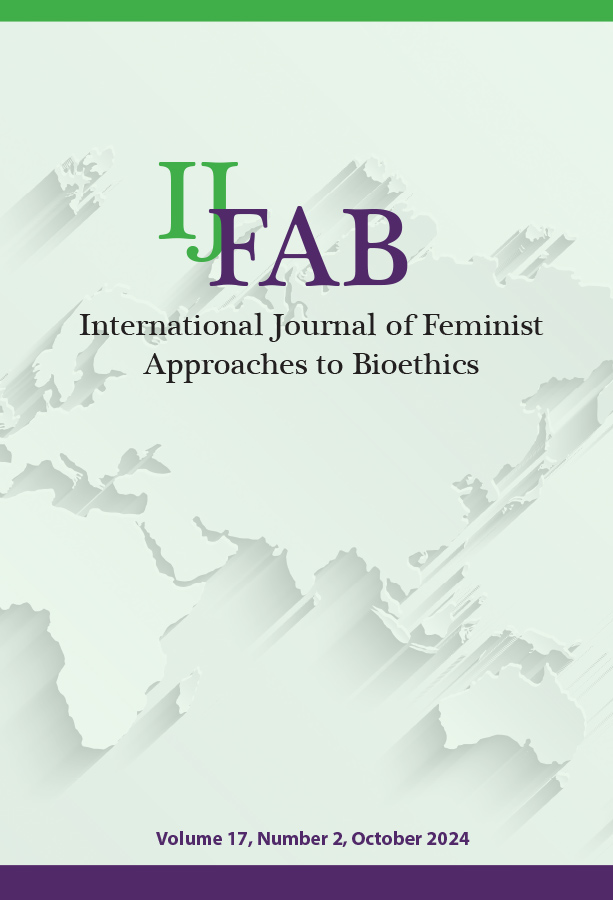The latest issue of the International Journal of Feminist Approaches to Bioethics is out now – from October 2024. It includes original essays, commentaries, and an author meets critic section on Microaggressions in Medicine, a book previously featured on the blog. Read on for summaries of this issue and links to each essay.
Essays
The development and regulation of hormonal contraception has been problematic—with concerns and safety of patients often being disregarded. Better birth control prescribing may lie in genetic testing. Direct-to-consumer genetic testing aimed at “personalizing the pill” exists, but regulations and clinical guidelines must adapt to meet the diverse needs of patients. This article analyzes emerging socio-ethical-legal tensions as hormonal contraceptives enter the pharmacogenomic era. Using a narrative lens, the author concludes that further patient-centered research—grounded in the voices of distinct populations—should inform policy so as to better serve birth control users and avoid the historical injustices with respect to hormonal contraception.
“Toward a Feminist Model for Women’s Healthcare: The Problem of False Consciousness and the Moral Status of Female Genital Cosmetic Surgery” by Shadi Heidarifar
This article is concerned with “all-or-nothing” approaches to female genital cosmetic surgeries, those that overemphasize either women’s autonomy to defend total accessibility or the oppressive social context affecting women to defend the total banning of the procedures. By contrast, the author takes both phenomena into consideration. The author argues identifying patterns of false consciousness and weighing those against harm done to a patient provides a moral basis for a doctor to possibly deny their consent at face value. This also requires a shift in understanding the doctor–patient relationship as a first step toward a feminist model for women’s healthcare.
“An Anticipated Reform of the Regulation on Assisted Reproduction Technology in China: An Emphasis on the Right to Reproduction” by Jingzhou Sun
The regulation of assisted reproduction technologies (ART) in China exhibits fragmentation, obsolescence, and a lower normative standing. Amid China’s demographic challenges, discernible indications suggest a possible shift in stance towards the stringent regulation of ART. The present study furnishes an elucidation of extant ART regulations, delineates the developmental trajectory of reproductive rights within the Chinese legal framework, scrutinizes societal perspectives endorsing emancipated reproductive autonomy for women, and culminates by underscoring the necessity to acknowledge and uphold autonomous and substantive reproductive rights throughout the process of reform. By comprehending and anticipating Chinese ART regulations, this article seeks to cultivate public discourse and enrich judicious decision-making among pertinent stakeholders.
“Why All US Medical Schools Have a Moral Obligation to Provide Abortion Training to Their Interested Students: A Necessary Response to Dobbs” by Spencer Schmid
Abortion is among the most widely disagreed upon topics in bioethics and healthcare. Consider how abortion is taught to medical students: while some medical schools incorporate abortion into their standard curriculum, others omit it entirely. In this article, the author argues these discrepancies go against society’s interest in producing physicians with comprehensive medical knowledge—especially for common procedures like abortions. The author thus argues all US medical schools have a moral obligation to provide abortion education and clinical training opportunities to their students. For the sake of argumentation, the author attempts to justify this claim remaining morally neutral on abortion.
Commentaries
“Abortion Bans: The Exceptions That Prove the Rule Makes No Sense” by Tamara Kayali Browne and Evie Kendal
Abortion is now “banned” in fourteen US states. Fetal personhood—the notion that fetuses should be considered equal persons—has been invoked in many anti-abortion laws. Yet none of the states actually ban abortion completely. Some states allow exceptions in cases of rape or incest, and at the very least, every state so far permits abortion if the pregnancy threatens the life of the pregnant person. However, it is impossible to uphold the validity of these exceptions while maintaining a position of legal equality between fetuses and pregnant people. The authors argue that this logical inconsistency should persuade supporters of near-total abortion bans to abandon their position entirely.
“At What Price? Abortion versus Artificial Womb” by Sonya Charles
The author’s goal in this article is to develop an argument for why women should have a right to abortion-as-termination even if some form of ectogenesis is created. First, the author shows why ectogenesis as an alternative to abortion does not protect women’s bodily autonomy because women are being forced to submit to coerced medical treatment and perform reproductive labor for others. Second, the author considers a further implication of her argument: If abortion-as-termination is kept, how far into gestation should this right extend? Third, and finally, the author considers whether people have the right to refuse genetic parenthood.
Authors Meets Critics
“Précis of Microaggressions in Medicine” by Lauren Freeman and Heather Stewart
“Epistemic Microaggressions and Their Harms” by Catherine Sherron
“Both Interpersonal and Structural Efforts Are Necessary for Healthcare Professionals to Avoid Committing Microaggressions” by Chidiogo Anyigbo
“Microaggressions among Healthcare Providers Facilitate Microaggressions toward Patients” by H. Rhodes Hambrick and Sonya Tang Girdwood
“Microaggressions in Medicine: Narratives, Trauma, and Silence” by Elizabeth Lanphier
“Response to Commentaries” by Lauren Freeman and Heather Stewart
Reviews
“Bleed: Destroying Myths and Misogyny in Endometriosis Care by Tracey Lindeman” by Sarah Seabrook
Remember that IJFAB seeks reviewers for recent works in feminist bioethics. More on latest titles seeking reviewers and how to contact the review editor here.


